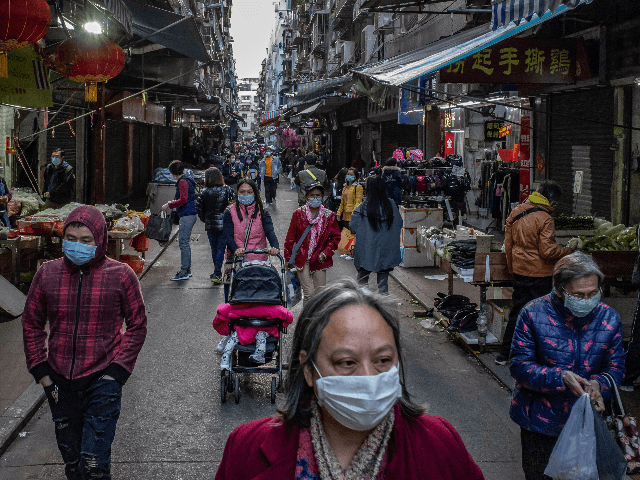The head of the World Health Organization’s (W.H.O.) investigative team in Wuhan, China, told the Chinese propaganda outlet Global Times on Friday that he believed it was “still worth” visiting for clues on the origins of the Chinese coronavirus despite the government’s wholesale destruction of evidence there.
A leaked Chinese government document, published by the South China Morning Post, revealed that the first confirmed case of Chinese coronavirus was diagnosed on November 17, 2019, in Wuhan, a central metropolis home to about 11 million people. No evidence exists suggesting that the coronavirus, never before documented in humans, had surfaced anywhere else in the world before the Wuhan cases.
Chinese Communist Party officials stated initially that they believed the origin of the virus was the Huanan seafood and live meat market in Wuhan, but have since denied this and claimed that the U.S. Army unleashed the virus on the world, providing no evidence for this claim. Some scientists have speculated that the virus jumped from an exotic animal to humans through exposure at a live animal market.
Chinese officials openly admitted in 2020 to destroying early samples of the coronavirus and “disinfecting” the Huanan site, considered a “wet market” due to the presence of live animals, killed on-site for consumption. While public health experts and animal rights activists have long decried wet markets as disease hubs and sites of extreme animal abuse, the W.H.O. gave its blessing to China reopening its wet markets in April 2020, at the initial height of the pandemic.
Now, over a year later, the W.H.O. has sent a team into Wuhan to investigate the “origin” of the pandemic. Responding to skepticism that any usable evidence remains at the origin site – or that the notoriously repressive Communist Party would allow the W.H.O. access to it, even if it existed – the head of the W.H.O. investigative team, Peter Ben Embarek, told the Global Times he expected to find critical information on his journey.
“[We hope to] understand the setting, see the places where cases were linked, reconstruct the initial event there, search for records of animals, products traded there,” the newspaper quoted the public health investigator as saying, “and possibly talking to some of the merchants who were there at that time.”
“There are information and records everywhere, so it is still worth exploring these places,” he insisted.
Ben Embarek said his team expects to be able to visit the grounds of the Huanan market, several hospitals that diagnosed early cases, and the Wuhan Institute of Virology, a laboratory that became the subject of speculation after former Secretary of State Mike Pompeo said the Chinese coronavirus “likely came from the Wuhan Institute of Virology.”
Ben Embarek claimed that “there will be no restrictions or limitations in working with our Chinese colleagues or in visiting places the joint team deem of interest,” contradicting reports this week that the Chinese government had begun censoring relatives of early coronavirus victims to prevent them from having access to the W.H.O. team.
Zhang Hai, a member of a WeChat social media group of families of Wuhan victims, denounced this week that the Communist Party had shut down the group inexplicably.
“When the WHO arrived in Wuhan, (authorities) forcibly demolished (the group). As a result we have lost contact with many members,” Zhang said, adding he believed Beijing was “afraid” of what these families could tell the investigators.
Zhang made headlines in May after accusing the government of Wuhan of infecting his father, Zhang Lifa, with coronavirus, causing his death. His father reportedly attended an appointment at a Wuhan hospital for an unrelated medical issue, then suddenly died, allegedly of coronavirus infection.
“The surgery had been very successful, and he was in good condition,” Zhang Hai told Al Jazeera at the time. “But soon, he began to have fevers frequently and before long his condition worsened and he went into a coma.”
Zhang has attempted to sue the Chinese government for their role in his father’s infection, and claims several other families of coronavirus victims have done the same, but the Chinese court system has failed to allow the lawsuits to advance.
Beijing has long delayed the arrival of a W.H.O. investigative team to Wuhan, most recently blocking some members of the team from entering the country and forcing those allowed in to endure a strict quarantine for two weeks. The delays will make finding critical evidence at key sites difficult given its erosion over time.
Officials with China’s National Health Commission admitted in May that they had destroyed early samples of the virus collected for research, necessary to document the virus’s genome and be able to identify it. The destruction, one official claimed, was necessary to “prevent the risk to laboratory biological safety and prevent secondary disasters caused by unidentified pathogens.”
Wuhan officials also closed off and regularly “disinfected” the Huanan market for months, likely destroying any evidence that may have been helpful to the W.H.O. team.
The People’s Daily, the official newspaper of the Chinese Communist Party, denounced accusations on Friday that Beijing had intentionally harmed the probe into the virus’s origins.
“The trip of the W.H.O. team revived the continuous blame that China has impeded the efforts on COVID-19 [Chinese coronavirus] tracing,” the People’s Daily noted. “The Western hysteria that surrounds China’s delay in origin tracing has been heightened since early January. Politicians like Australian Foreign Minister Marise Payne and British Foreign Secretary Dominic Raab had urged an early W.H.O.-led investigation into China as soon as possible.”
“Some Western politicians seem obsessed with hyping up the anti-China sentiment,” the newspaper concluded, before repeating the poorly substantiated allegation that the Chinese coronavirus originated in Maryland.

COMMENTS
Please let us know if you're having issues with commenting.